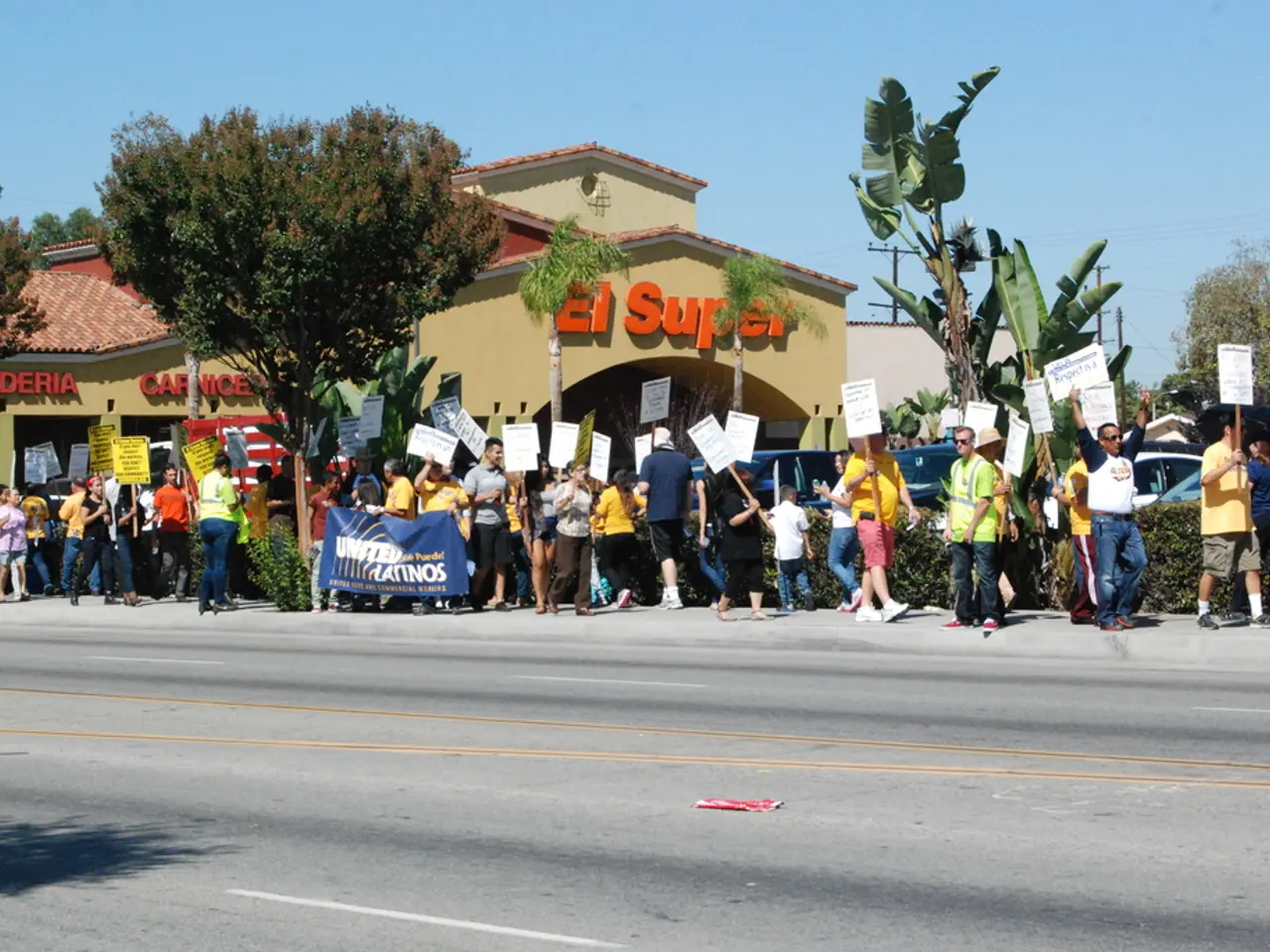Donald Trump's approval ratings are plummeting. Yet, he remains steadfast in his current strategies.
In a striking display of political resilience, President Donald Trump continues to pursue controversial policies despite plummeting approval ratings, with 55% of Americans expressing disapproval of his performance in office [1]. This persistence can be largely attributed to his loyal base, primarily his "Make America Great Again" (MAGA) supporters, who view these actions favourably, even as the broader public disapproves.
One of the key contentious policies is the recent tax and budget law, which combines tax cuts with spending reductions, particularly in Medicaid and the Affordable Care Act. This law, widely criticised as harmful to lower-income families and those dependent on Medicaid, enjoys majority support among Republicans and MAGA supporters, but is unpopular among the majority of Americans, including most Democrats and independents [1].
Another controversial move by Trump is his executive order on homelessness, which treats homelessness and mental illness as crimes. This order has been widely condemned by advocacy groups for worsening homelessness and disproportionately harming marginalised communities, particularly Black and Brown people [2].
The consequences of this trend in U.S. politics are far-reaching. increased polarization could deepen divisions between Trump's supporters and opponents, making bipartisan cooperation more difficult. Policies criticised for cutting healthcare and housing support risk increasing homelessness, health insecurity, and economic hardship among low-income Americans [1][2].
Moreover, using punitive approaches to social issues like homelessness may undermine trust in government and law enforcement, exacerbating social tensions [2]. The focus on maintaining a dedicated base rather than majority approval could also result in more radicalised policy agendas and political discourse, potentially affecting future election outcomes and governance stability [3].
Trump's refusal to change course reflects a larger autocratic trend by the American right, which includes voter suppression, gerrymandering, and ignoring the public will on various issues. It's concerning to note that the United States has only been a full de jure democracy for approximately 60 years, since the passage of the Civil Rights Act and the Voting Rights Act in 1964 and 1965.
As the world watches, the question arises: what happens when public opinion matters little in the face of a president who refuses to be held accountable by long-held norms, elections, institutions, and other democratic means? The answer, it seems, is a polarised nation grappling with the potential erosion of trust and the impact on political discourse and elections.
References: [1] Pew Research Center. (2021). Trump's approval rating remains low, with 55% disapproving of his job performance. [2] National Coalition for the Homeless. (2020). Trump's executive order on homelessness: A critical analysis. [3] The Brookings Institution. (2020). The radicalisation of American politics: What does it mean for democracy?
- The persistent pursuit of controversial policies by President Trump, amidst low approval ratings, underscores the significance of education and self-development in understanding the political landscape.
- Understanding the media's role in shaping public opinion becomes critical in this context, as it can greatly influence people's views on policies and leaders.
- The scientific community has a key part to play in this narrative, as evidence-based research can help illuminate the real-world impacts of such policies.
- The world watches as these events unfold, with many countries scrutinizing the state of American politics and its potential implications on global affairs.
- At the heart of these controversies lies the issue of healthcare, with policies like the tax and budget law and the lack of affordable care posing significant threats to the health and well-being of many Americans.
- Migration, another contentious topic, becomes closely intertwined with societal issues like health and economic hardship, as displaced individuals often find themselves vulnerable and in need of support.
- The political landscape also impacts career development, with workers seeking opportunities in fields aligned with government policy and legislation.
- In the realm of personal growth, mindfulness and goal-setting skills become crucial in navigating through turbulent times, fostering resilience and adaptability.
- As more people turn to online education for skill-training and job-search assistance, the quality and accessibility of digital learning resources become paramount in preparing individuals for the job market.
- In the backdrop of these events, general news and crime-and-justice updates offer valuable perspectives on the state of the nation, shaping public opinion on policy matters and electoral choices.
- The rise in car-accidents, fires, and other accidents highlights the need for effective policies in ensuring public safety and actively addressing environmental concerns.
- As lifelong learning and continuous skills-training become increasingly essential in today's dynamic world, it's important for individuals to seek learning opportunities that are adaptable and forward-looking.
- Ultimately, the future of American politics hinges on its ability to foster a climate of bipartisan cooperation, addressing issues of war-and-conflicts, policy-and-legislation, and social justice in a fair and inclusive manner.




